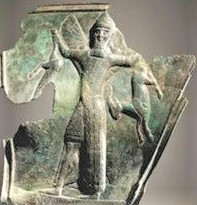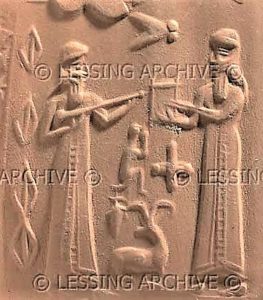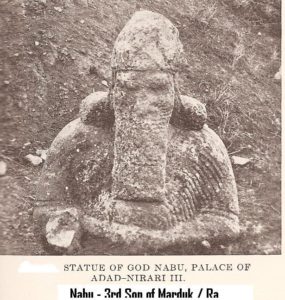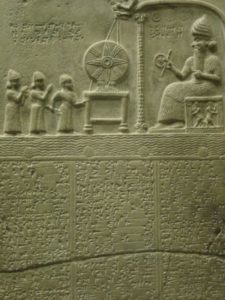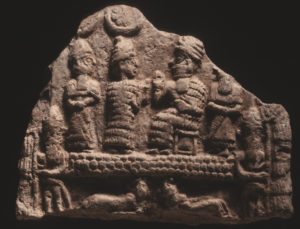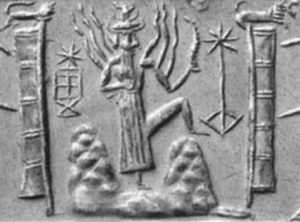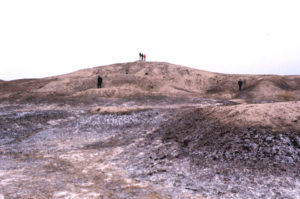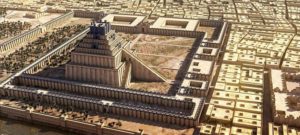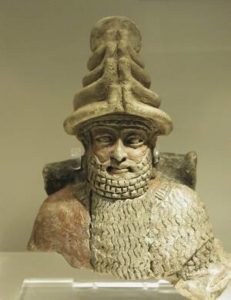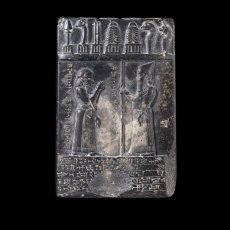http://oracc.museum.upenn.edu
(Texts: All Artifacts, Color Coding, & Writings in Bold Type With Italics Inside Parenthesis, are Added by Editor R. Brown, not the Authors, Translators, or Publishers!)
(gods in blue …mixed-breed demigods in teal…)
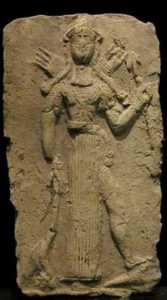
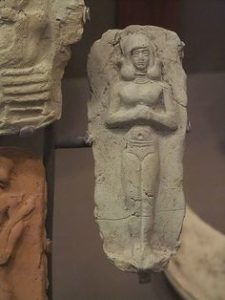 (Ishtar / Inanna, powerful giant alien goddess of love & war)
(Ishtar / Inanna, powerful giant alien goddess of love & war)
For the goddess Ištar (Inanna), mistress of the lands, supreme (among) the gods,
valiant, the goddess Nineanna (‟Lady of Eanna”) (ziggurat / residence), who dwells in Uruk,
who has gathered to herself all the divine offices:
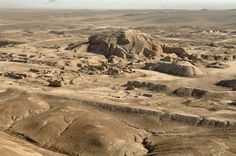
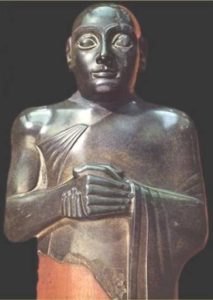 (Uruk city with E-ana, Inanna’s ziggurat / residence; Shulgi)
(Uruk city with E-ana, Inanna’s ziggurat / residence; Shulgi)
(With regard to) Eanna, which Šulgi, a previous king, had had built and which had become old,
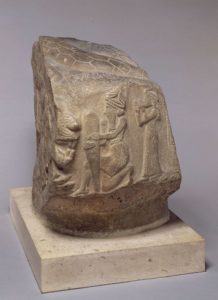 (Ningishzidda designed & set the foundation pegs to ziggurats, sometimes kings worked alongside)
(Ningishzidda designed & set the foundation pegs to ziggurats, sometimes kings worked alongside)
and (with regard to) the shrine of the god Ningizzida, which Anam, an earlier king, had had constructed inside it, (5)
(with regard to) this temple, whose walls had buckled and whose bondings had disintegrated,
whose [para]pet had collapsed and which had become unrecognizable,
(and) whose reconstruction had not [occ]urred to the kings, (his) predecessors,
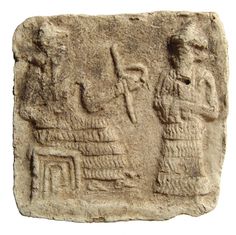 (Enki’s eldest son Marduk & Marduk’s 3rd son Nabu, gods of Babylon & Borsippa)
(Enki’s eldest son Marduk & Marduk’s 3rd son Nabu, gods of Babylon & Borsippa)
[At that] time, the great lord, the god Marduk, had turned away in divine wrath from the land of Akkad,
and the evil enemy, the Subarian, exercised the rule over the land of Akkad for [seve]n [years, (10)
unt]il the days had elapsed, the appointed time had arrived, (and) the great [lord], the god Marduk,
became reconciled with the land of Akkad, with which he had become angry
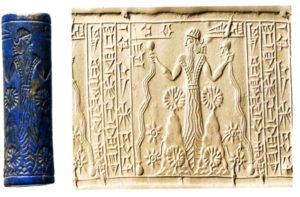
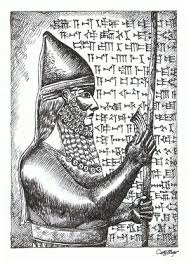 (god Marduk; Babylonian KIng Marduk-apla-iddina II)
(god Marduk; Babylonian KIng Marduk-apla-iddina II)
He (the god Marduk) looked (with favour) upon Marduk-apla-iddina (II), king of Babylon,
prince who reveres him, to whom he (the god Marduk) stretched out his hand,
legitimate eldest son of Erība-Marduk, king of Babylon, who has made firm the foundation(s) of the land.
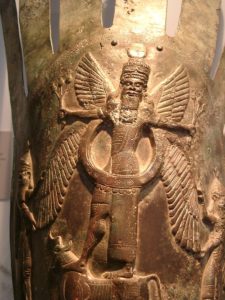
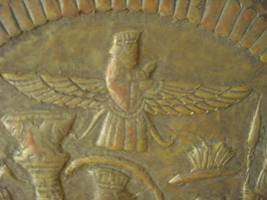 (alien giant Anunnaki King Anu; Anu in his winged sky-disc)
(alien giant Anunnaki King Anu; Anu in his winged sky-disc)
The king of the gods, the god Asari (Anunnaki King Anu),
duly named him [to] the shepherdship of the land of Sumer and Akkad
(and) personally [sa]id: “This is indeed the shepherd who will gather the scattered (people).”
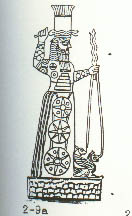
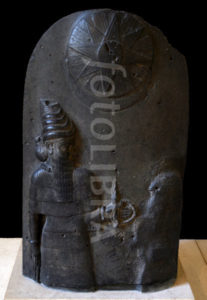 (Marduk; giant Utu with smaller Babylonian mixed-breed king)
(Marduk; giant Utu with smaller Babylonian mixed-breed king)
[With] the power of the great lord, the god Marduk, and of the hero of the gods, the god Utulu (Utu),
he defeated the widespread army of Subartu and shattered their weapons.
He brought about their overthrow and prevented them from treading on the territory of the land of Akkad.
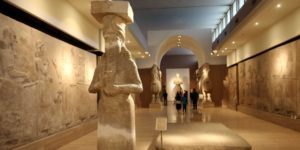 (life-sized statue of Enki, Marduk’s father & wisest of the gods)
(life-sized statue of Enki, Marduk’s father & wisest of the gods)
With the excellent understanding which the god Ea (Enki), the creator, maker of all things, had bestowed upon him, (20)
(and with) the extensive knowledge which the god Ninši[ku] (unidentified) had granted him,
he directed his attention to performing the rites, to administering correctly the rituals,
and to renovating the cult centres and the sanctuaries of the divine residences of the great gods of the land of Akkad.
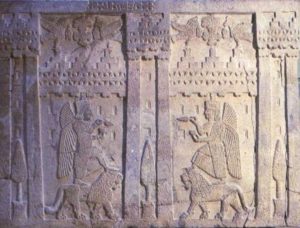 (warrior goddess Inanna atop her zodiac symbol Leo on city gate)
(warrior goddess Inanna atop her zodiac symbol Leo on city gate)
He was assiduous toward the sanctuaries of Eanna, the abode of the goddess Ištar, mistress of the lands, his lady.
(With regard to) the outer enclosure wall of Eanna in the lower courtyard (25)
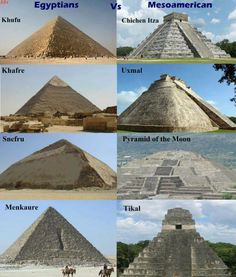
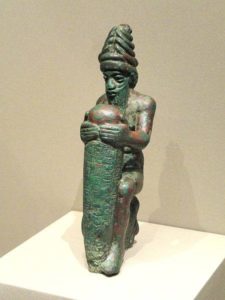 (Ningishzidda set the foundation pegs to the ziggurats of the world)
(Ningishzidda set the foundation pegs to the ziggurats of the world)
and (with regard to) the temple of the god Ningizzida, which had been constructed inside it to one side,
he tore down its parapet and laid bare [its] foundation.
With fervent entreaties, prayers, and expression(s) of humility,
he laid its foundations (anew) and made (them) as firm as a mountain.
He raised its top with (ritually) pure bricks and made (it) as bright as daylight.
He made (it) larger than before and fashioned (its) structure artfully.
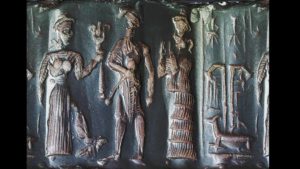 (Inanna, mixed-breed giant king, & his mother goddess Ninsun)
(Inanna, mixed-breed giant king, & his mother goddess Ninsun)
On account of this, when the goddess Ištar, mistress of the lands, looks upon this work with pleasure,
may she bestow a (long) life on Marduk-apla-iddina (II), king of Babylon!
May she increase his years and may he experience the fullness of old age!
By her august command, which cannot be changed, may he subjugate at his feet all of his enemies
and may the kings, his enemies, drag their weighty [trib]ute — the [abun]dance of the four quarters (of the world),
the yield of mountain and sea — into Šuanna (Babylon)! (35)
May he receive their [pres]ent and may he bring (them) into Esagila, before the lord of lords!
May his reign be established in Babylon for all time!
I saw the royal inscription of a king who had preceded me (and) who had built that temple.
I did not alter his royal inscription, but (rather) I placed (it) with my own royal inscription.
Anyone in the future — whether king, or son of a king, or commissioner,
or [govern]or, or chief administrator (of a temple), or mayor —
who, appointed by the great lord, the god Marduk, decides to (re)build Eanna,
let him see this royal inscription and let him place (it) with his own royal inscription for the future!
2nd Inscription
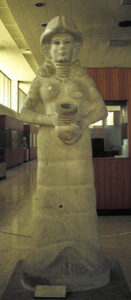
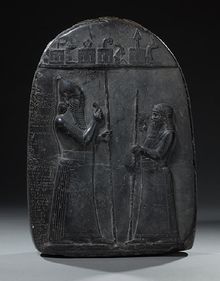 (Inanna, giant alien goddess; smaller giant mixed-breed descendant-king Marduk-apla-iddina II, & even smaller earthling Babylonian official on kudurru boundary stone)
(Inanna, giant alien goddess; smaller giant mixed-breed descendant-king Marduk-apla-iddina II, & even smaller earthling Babylonian official on kudurru boundary stone)
For the lady, goddess Inanna, mistress of the lands, his lady:
Marduk-apla-iddina (II), (5) king of Babylon, descendant of Erība-Marduk,
king of Sumer (and) Akkad, (re)constructed Eanna, her beloved temple.
3rd Inscription
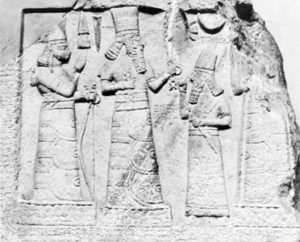 (giant gods Inanna & Adad with smaller mixed-breed giant descendant-king)
(giant gods Inanna & Adad with smaller mixed-breed giant descendant-king)
For the lady, goddess Inanna, mistress of the lands, his lady:
Marduk-apla-iddina (II), (5) king of Babylon, king of Sumer (and) Akkad, king with clean hands,
in (his) second kingship (re)constructed Eanna, (10) her beloved temple, for the sake of his life.
4th Inscription
To his lord, Marduk-apla-iddina (II), son of Iakīn, presented (this object).
5th Inscription
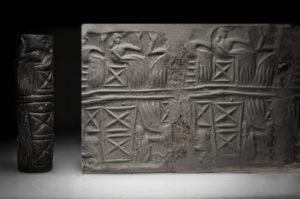 (Ninlil & spouae Enlil, equal Earth Colony Commanders)
(Ninlil & spouae Enlil, equal Earth Colony Commanders)
For the goddess Ninlil, great lady, august lady, compassionate mother, who dwells in Ekurnizu
(‟House, Fearsome Mountain”), which is inside Hursag[kalama (…), his lady]:
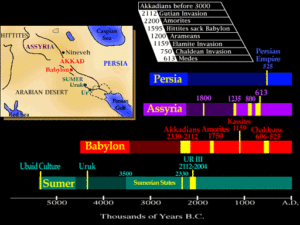
Marduk-apla-iddina (II), <king> of Babylon, king of the land of Sumer and Akkad,
had baked bricks made (for) the bridge over the Nār-Bānītu canal, which from […].
He had (the bridge) built in order to ensure his good health and his life, and he presented (it to her).
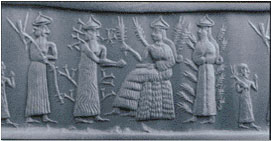 (Enlil with plow, father-in-law Haia – barley god, mother-in-law Nisaba – goddess of grains, Enlil’s spouse Ninlil – grain goddess, & unidentified)
(Enlil with plow, father-in-law Haia – barley god, mother-in-law Nisaba – goddess of grains, Enlil’s spouse Ninlil – grain goddess, & unidentified)
On account of this, when [the goddess Ninlil (…)] looks at this temple with pleasure,
[…] of/which Iddin-Nergal, governor of Kish, the servant who reveres you, in Ki[sh …]
to live in safety, to have a long life (and) years of plenty and abundance, for the king, his lord,
to that man […] may she give him as a present! For kingship […]!
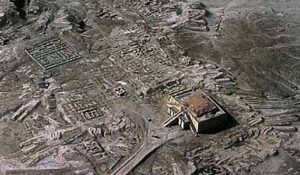 (E-kish-nugal, Nannar’s ziggurat temple residence in Ur)
(E-kish-nugal, Nannar’s ziggurat temple residence in Ur)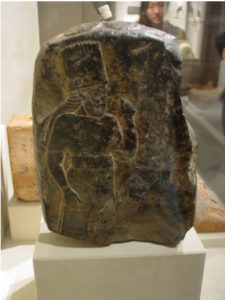 (Babylonian semi-divine blooded King Marduk-nadin-ahhe)
(Babylonian semi-divine blooded King Marduk-nadin-ahhe)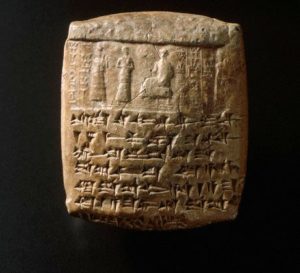 (Ninsun, semi-divine descendant-king, & Nannar seated, god of Ur)
(Ninsun, semi-divine descendant-king, & Nannar seated, god of Ur)